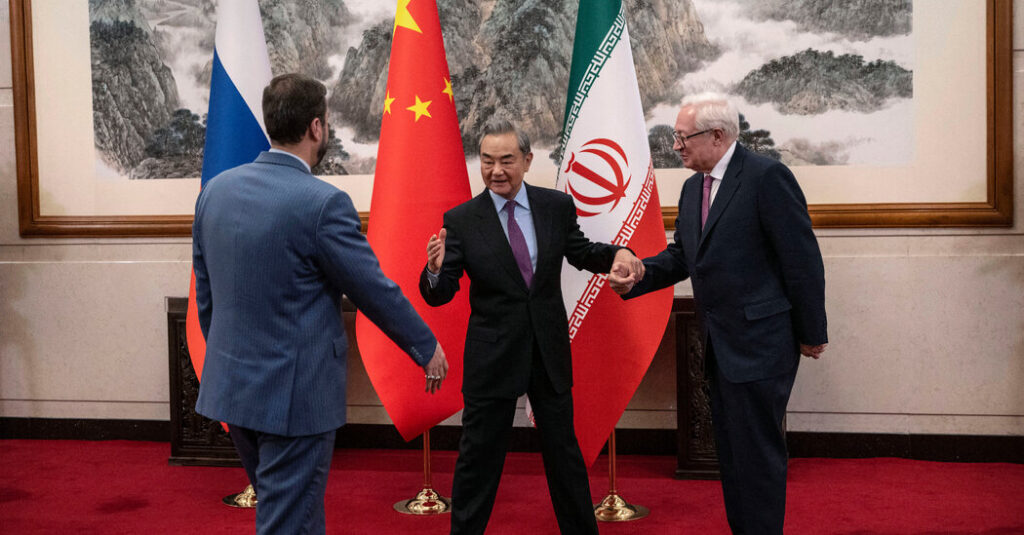China and Russia joined Iran on Friday in urging an end to Western sanctions after President Trump called this week for nuclear talks with Tehran, with both countries denouncing the “threat of force.”
After talks in Beijing with the deputy foreign ministers of Russia and Iran to discuss Iran’s nuclear program, the Chinese government said the three countries had agreed that all parties should “abandon sanctions, pressure and threats of force.”
That appeared to be a reference to recent overtures that Mr. Trump has made toward Iran. Mr. Trump said last week that he had sent a letter to the Iranian government seeking to negotiate a deal to prevent Tehran from acquiring a nuclear weapon. But he warned that the country would have to choose between curbing its fast-expanding program and losing it in a military attack.
The meeting was the latest sign of Beijing’s close alignment with Moscow and Tehran, and of its ambition to become a key arbiter of international disputes. Earlier this week, the three countries held joint naval drills in the Gulf of Oman.
China and Russia are taking a very different approach to Iran now than they did a decade ago. In 2015, they insisted on first reaching a deal with Iran to stop its nuclear weapons program before ending sanctions. Russia even took a lot of Iran’s nuclear fuel stockpile as part of that arrangement.
The United States is now pursuing maximum political pressure with a threat of military action. But China and Russia are pursuing a more cooperative and conciliatory approach. This means that major powers are divided on how to approach Iran, which may give Tehran more diplomatic room to maneuver.
“Russia and China are also signaling to other countries that there are alternatives to U.S. global leadership — that Moscow and Beijing are responsible global actors that can address major global challenges like nuclear weapons,” said Andrea Kendall-Taylor, a senior fellow at the Center for a New American Security, a Washington research group.
The most concerning part of the Iranian program is the production of potential nuclear weapons material that has been enriched to 60 percent purity, which is nearly bomb-grade. It could take a week or so to convert it to the 90 percent purity required for use in bombs that produce large nuclear detonations. Experts believe Iran may now have enough for roughly six weapons.
Russia and China did not present a plan to remove or reduce in purity the Iranian supply of potential nuclear weapons material. Nor did they address Iran’s installation of more advanced centrifuges, which will increase the size of the country’s stockpile of enriched material.
The Iranian government said in late November that it would begin operating the advanced centrifuges to enrich more uranium, which could bring it closer to having a nuclear weapon.
Wang Yi, China’s foreign minister, issued a five-point plan for addressing Iran’s nuclear program. While calling for an end to sanctions on Iran, the plan also urged Iran to “continue to abide by its commitment not to develop nuclear weapons.”
Beijing wants to show that “while the United States irresponsibly pulls out of the Iran Nuclear Agreement, China will also hold fast to this international commitment and assume the responsibility of leadership,” said Shen Dingli, an international relations scholar in Shanghai.
The message is also one of solidarity with Iran. “Even though the United States exerts extreme pressure, as long as Iran does not give up on its relevant commitments, it will still have friends,” Mr. Shen said. “Iran doesn’t need to worry. In the end, this is a strategic game between China and the United States.”
Iran’s supreme leader last week decried “bullying governments” and seemed to push back on the idea of negotiating with the United States.
China and Russia’s support could help Iran seem less isolated, but Tehran might have concerns, as well.
“The Iranians, for their part, are very wary of Chinese, but especially of Russian involvement in negotiations, as they fear they will be sold out by Moscow as part of a broader U.S.-Russia accord,” said Gregory Brew, a senior analyst at the Eurasia Group. “They will be looking for support from Russia while resisting any pressure to give in to U.S. demands.”
China has considerable leverage over Iran: Chinese companies purchased over 90 percent of Iran’s oil exports last year, often at deep discounts to world prices, according to Kpler, a Vienna-based company that specializes in tracking Iran’s oil shipments. Most other countries have refrained from buying oil from Iran so as to comply with Western-led sanctions aimed at persuading Iran to stop its development of nuclear weapons.
Sales by Iran’s state oil company to China represent about 6 percent of Iran’s entire economy, or half of government spending in Iran.
David E. Sanger contributed reporting from Washington and David Pierson from Beijing.


